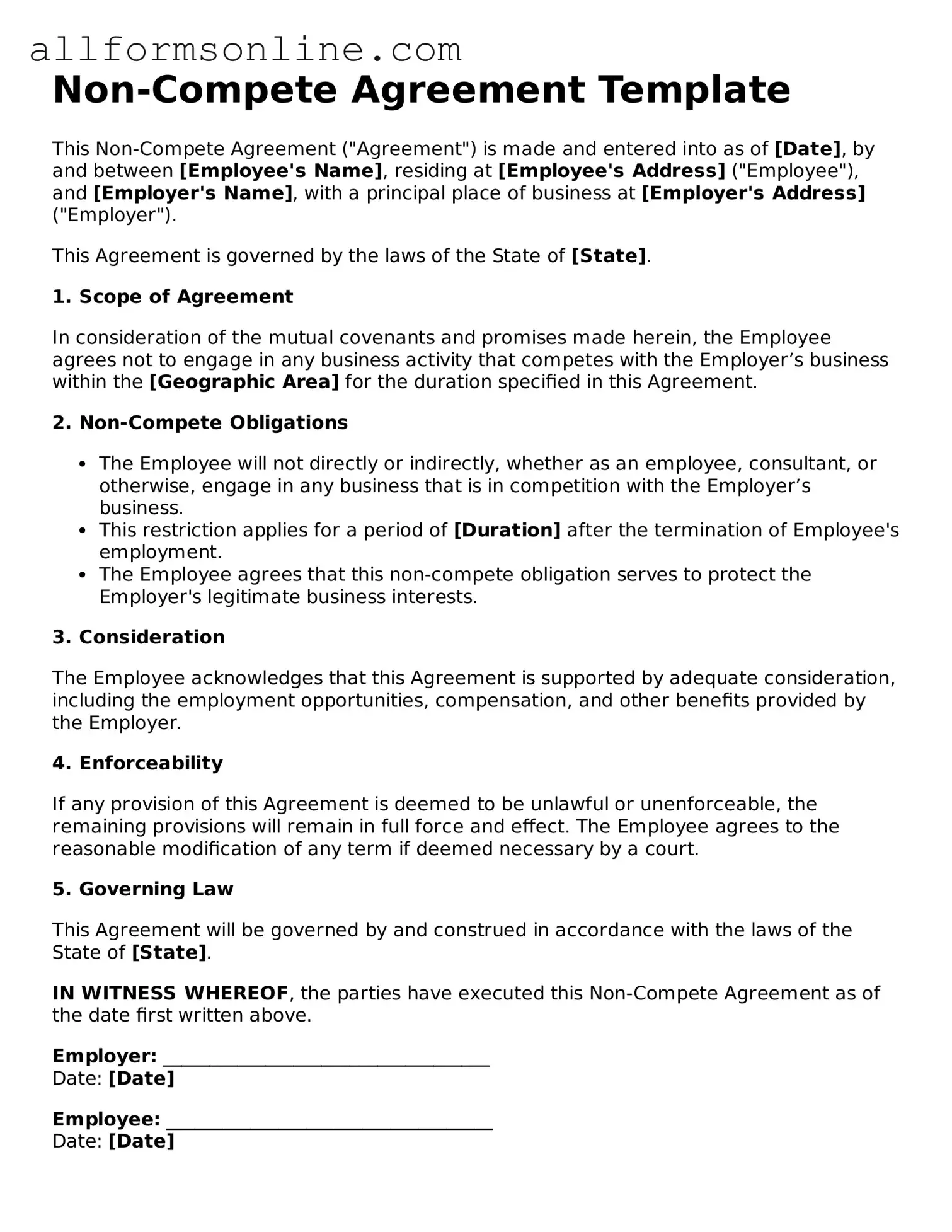Blank Non-compete Agreement Form
Non-compete AgreementDocuments for Particular States
Misconceptions
Non-compete agreements often come with a variety of misconceptions. Understanding these can help both employers and employees navigate their rights and obligations more effectively. Here are seven common misconceptions:
- Non-compete agreements are always enforceable. Many people believe that if a non-compete agreement is signed, it must be upheld. However, enforceability depends on state laws and the specific terms of the agreement.
- All non-compete agreements are the same. Each non-compete agreement is unique. The terms, duration, and geographic scope can vary significantly, impacting their enforceability.
- Employees cannot work in their field at all. Some think that a non-compete prohibits any work in their field. In reality, it typically restricts work with specific competitors or within a defined timeframe.
- Non-compete agreements only apply to high-level employees. While these agreements are often associated with executives, they can apply to any employee, depending on the nature of the job and the business interests involved.
- Signing a non-compete means you can't leave your job. A non-compete does not prevent an employee from resigning. However, it may limit their options for future employment in a similar field.
- Employers can enforce non-compete agreements regardless of circumstances. This is not true. Courts often consider factors such as reasonableness and the employee's role when determining enforceability.
- Non-compete agreements are only for protecting trade secrets. While they can protect trade secrets, non-compete agreements also safeguard customer relationships and business strategies.
Understanding these misconceptions can lead to more informed decisions regarding employment contracts and negotiations.
What to Know About This Form
What is a Non-compete Agreement?
A Non-compete Agreement is a legal contract between an employer and an employee. It restricts the employee from engaging in activities that compete with the employer’s business for a specified period after leaving the company. The purpose of this agreement is to protect the employer's business interests, including trade secrets and client relationships.
Why would an employer require a Non-compete Agreement?
Employers often require Non-compete Agreements to safeguard their competitive edge. By preventing former employees from joining rival companies or starting similar businesses, employers aim to maintain their market position and protect sensitive information. This is particularly common in industries where proprietary knowledge is crucial for success.
How long does a Non-compete Agreement last?
The duration of a Non-compete Agreement can vary significantly depending on the terms set forth in the contract. Typically, these agreements last from six months to two years. However, the enforceability of the duration may depend on state laws and the specific circumstances surrounding the employment.
Are Non-compete Agreements enforceable in all states?
No, the enforceability of Non-compete Agreements varies by state. Some states, like California, generally do not enforce these agreements, while others may uphold them under certain conditions. It is essential to understand the laws in your state regarding Non-compete Agreements to determine their validity.
What should I consider before signing a Non-compete Agreement?
Before signing a Non-compete Agreement, consider the scope of the restrictions, including the geographic area and duration. Evaluate how these limitations may impact your future employment opportunities. It may also be beneficial to consult with a legal professional to ensure that the terms are fair and reasonable.
Can I negotiate the terms of a Non-compete Agreement?
Yes, it is possible to negotiate the terms of a Non-compete Agreement. If you find certain clauses unfavorable, discuss your concerns with your employer. Employers may be willing to modify the agreement to make it more acceptable, especially if they value your skills and contributions.
What happens if I violate a Non-compete Agreement?
If you violate a Non-compete Agreement, the employer may take legal action against you. This could include seeking damages or an injunction to prevent you from continuing in a competing role. The consequences can be serious, so it is important to fully understand the agreement before taking any actions that may breach it.
Popular Templates:
Family Member Eagle Scout Recommendation Letter From Parent - His commitment to personal growth and self-improvement is evident in his achievements.
How to File a Mechanics Lien in California - The Mechanic’s Lien can offer significant leverage during negotiations, as it indicates serious intent to recover owed funds.
Having a comprehensive and well-structured document is essential when entering into a vehicle sale, which is where the Fast PDF Templates come into play, providing a clear framework to ensure that all necessary details are appropriately captured and agreed upon by both the buyer and the seller.
Correction Deed California - It can help in aligning the legal description of the property with physical boundaries.
How to Use Non-compete Agreement
Once you have obtained the Non-compete Agreement form, it is essential to fill it out accurately to ensure that all necessary information is provided. The following steps will guide you through the process of completing the form effectively.
- Begin by entering your full legal name in the designated space at the top of the form.
- Next, provide your current address, including city, state, and zip code.
- Fill in the date on which you are completing the form.
- Identify the employer or company name in the section provided.
- Clearly state the position you hold or will hold within the company.
- Outline the specific terms of the non-compete agreement as indicated in the form. Be precise about the duration and geographical area covered by the agreement.
- Review the obligations and restrictions outlined in the form to ensure you understand them fully.
- Sign and date the form at the bottom, confirming your agreement to the terms.
After completing the form, ensure that you keep a copy for your records. It may also be beneficial to discuss the agreement with a legal professional to clarify any uncertainties before submission.
